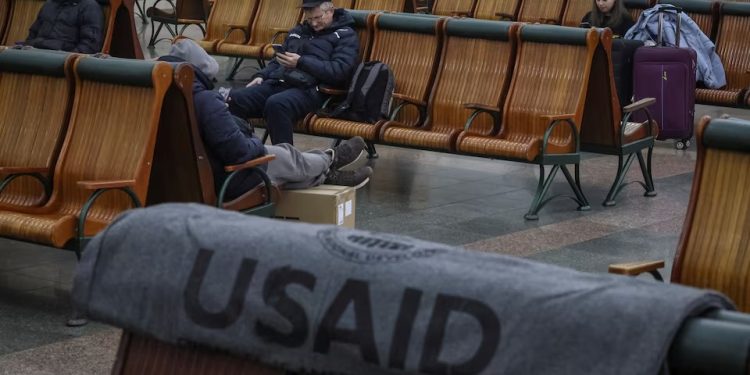Trump’s Aid Cuts Imperil Emerging Market Investment Cash
The United States’ decision to freeze and potentially scrap its core aid agency jolted countries receiving its funding and could make it harder for emerging economies to attract private cash, investors said.
The U.S. Agency for International Development (USAID) not only disbursed $44 billion in fiscal 2023, but anchors private investment in everything from healthcare to small businesses, and underpins the creditworthiness of bigger emerging markets borrowing money on sovereign debt markets.
Its elimination could undermine investment in countries from Sri Lanka to South Africa and make it more expensive for them to borrow on international markets.
Money from the agency, investors say, enables start-ups in the world’s poorest countries to grow to the point they can lure private investors.
Elsewhere, relatively small amounts of its money help lower the risk for banks and other lenders looking to invest in efforts to expand irrigation, or build hospitals, leveraging the cash into millions more. Its support can boost the ability of governments to repay debts, bolstering their economies.
“They do have implications for the medium and long-term creditworthiness of a country,” said Giulia Pellegrini, senior portfolio manager for emerging market debt at Allianz Global Investors, referring to the cuts.
The near-total U.S. foreign aid funding freeze took effect last month and President Donald Trump said he would like to wind down USAID.
For Simon Schwall, chief executive of Africa-focused startup Oko – which is backed by Morgan Stanley and Newfund Capital and facilitates and designs crop insurance for farmers in Mali, Ivory Coast and Uganda – the impact has been immediate.
He said the company is at risk of closure without USAID money which would have accounted, directly and indirectly, for 80% of Oko’s cashflow this year.
“We cannot raise the investment we were planning to,” without replacing USAID, he said. “We are very much at risk of having to close the business if we don’t find any alternative partners.”
Alternatives are limited. The United States provided 42% of all humanitarian aid tracked by the United Nations in 2024, and other countries have also sought to cut aid spending.
The rapid pull-back could also knock some struggling nations like Ethiopia immediately and erode other economies.
“It could be a big setback for these frontier markets,” said Seaport Global emerging market credit analyst Himanshu Porwal.
IMMEDIATE AND EXTENSIVE
Emerging markets were poised for an investor comeback after years of punishing outflows due to the COVID-19 pandemic, high global interest rates and Russia’s invasion of Ukraine.
Debt restructurings in Ghana, Sri Lanka and Ukraine boosted hopes that private cash inflows could help meet growing – and expensive – needs for everything from climate change to infrastructure.
The outlook is now murkier.
Florian Kemmerich, managing partner with impact investment specialist firm KOIS, said the speed and depth of the U.S. cuts could diminish the number of investable projects.
“You need not-for-profit capital… otherwise it wouldn’t work, because the mismatch of risk and return is something which makes no sense,” he said.
USAID typically offers grants and technical support, but it has also enabled some blended finance, and its $70 million investment fund with Norway aimed to spur hundreds of millions of investment dollars for farmers and agricultural businesses in Africa.
CREDITWORTHY IMPACTS
Bond investors said they were closely monitoring the cuts and implications for countries like Ethiopia, the second-largest recipient of USAID after Ukraine.
The East African country is in the midst of restructuring its sole sovereign dollar bond and working to recover from a punishing civil war.

“In terms of overall financing needs, the U.S. aid is a lot more meaningful for the likes of Ethiopia,” said abrdn portfolio manager Edwin Gutierrez, adding that it “doesn’t have a lot of funding sources available to it”.
Ethiopian officials did not immediately comment.
Ukraine, embroiled in three years of war with Russia, got over $16 billion from USAID last year – nearly 10% of its GDP.
Timothy Ash, senior sovereign strategist with RBC BlueBay Asset Management, noted that former U.S. President Joe Biden front-loaded about $50 billion of funding for Ukraine this year – and Europe also provided money.
“They have a war chest of about $100 billion that should insulate them,” Ash said. But “it’s damaging, definitely.”
Other recipients, such as Nigeria or Kenya, can replace lost aid with borrowing. Kenya’s finance minister told
Reuters the country would need to reallocate spending if the freeze becomes permanent, while
Nigeria increased the size of its 2025 budget to 54.2 trillion naira ($36.4 billion) on Wednesday, from 49 trillion naira.
South Africa, a Trump target over a land expropriation law, gets 17% of its HIV/AIDS programme funding from the United States. Not replacing it risks causing an economic drag if those living productively with the illness fall sick.
Pellegrini noted that borrowing – and building up potentially expensive debt – comes at a cost.
“That will imply, in turn, that they will go to the capital markets, they will issue bonds, perhaps at higher yields, which will in turn again impact their budgets and what they can do with the money,” she said. “So it’s a vicious cycle.”








